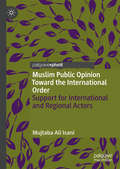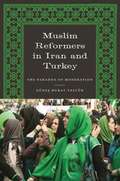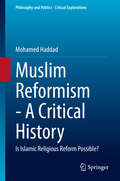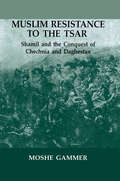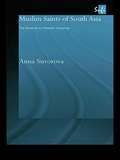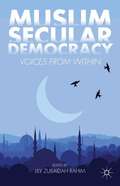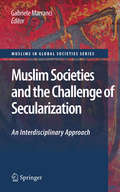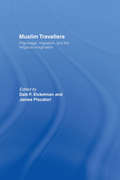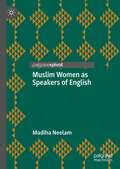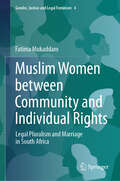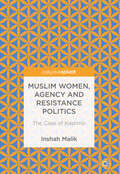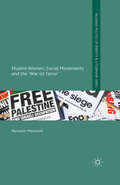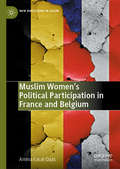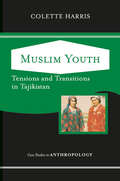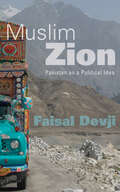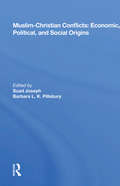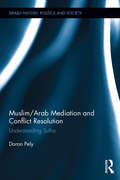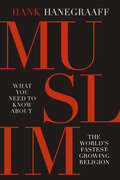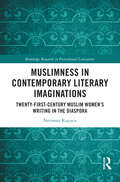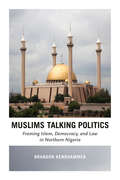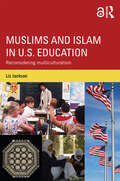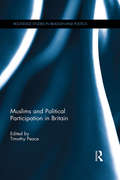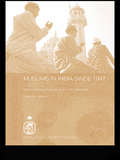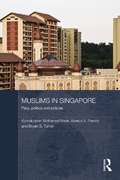- Table View
- List View
Muslim Public Opinion Toward the International Order: Support For International And Regional Actors
by Mujtaba Ali IsaniThis book analyses the attitudes of Muslim citizens toward international and regional actors. In essence, the project examines whether Muslim public opinion is in favor of the current international order and if there is an ideal type of international governance perceived by Muslim citizens. The author connects the analysis to the literature of international public opinion and to the research on social legitimacy of international and global governance. It is ideal for scholarly audiences interested in Islamic, International and Global Governance Studies.
Muslim Reformers in Iran and Turkey
by Güne Murat TezcürModeration theory describes the process through which radical political actors develop commitments to electoral competition, political pluralism, human rights, and rule of law and come to prefer negotiation, reconciliation, and electoral politics over provocation, confrontation, and contentious action.<P><P> Revisiting this theory through an examination of two of the most prominent moderate Islamic political forces in recent history, Muslim Reformers in Iran and Turkey analyzes the gains made and methods implemented by the Reform Front in the Islamic Republic of Iran and the Justice and Development Party in Turkey. Both of these groups represent Muslim reformers who came into continual conflict with unelected adversaries who attempted to block their reformist agendas. Based on extensive field research in both locales, Muslim Reformers in Iran and Turkey argues that behavioral moderation as practiced by these groups may actually inhibit democratic progress. Political scientist Günes Murat Tezcür observes that the ability to implement conciliatory tactics, organize electoral parties, and make political compromises impeded democracy when pursued by the Reform Front and the Justice and Development Party. Challenging conventional wisdom, Tezcür's findings have broad implications for the dynamics of democratic progress.
Muslim Reformism - A Critical History: Is Islamic Religious Reform Possible? (Philosophy and Politics - Critical Explorations #11)
by Mohamed HaddadThis book examines the evolution of Islam in our modern world. The renowned Tunisian scholar Mohamed Haddad traces the history of the reformist movement and explains recent events related to the Islamic religion in Muslim countries and among Muslim minorities across the world. In scholarly terms, he evaluates the benefits and drawbacks of theological-political renovation, neo-reformism, legal reformism, mystical reformism, radical criticism, comprehensive history and new approaches within the study of Islam. The book brings to life the various historical, sociological, political and theological challenges and debates that have divided Muslims since the 19th century. The first two chapters address failed reforms in the past and introduce the reader to classical reformism and to Mohammed Abduh. Haddad ultimately proposes a non-confessional definition of religious reform, reinterpreting and adjusting a religious tradition to modern requirements. The second part of the book explores perspectives on contemporary Islam, the legacy of classical reformism and new paths forward. It suggests that the fundamentalism embodied in Wahhabism and Muslim Brotherhood has failed. Traditional Islam no longer attracts either youth or the elites. Mohamed Haddad shows how this paves the way for a new reformist departure that synthesizes modernism and core Islamic values.
Muslim Resistance to the Tsar: Shamil and the Conquest of Chechnia and Daghestan
by Moshe GammerFirst published in 2003. Routledge is an imprint of Taylor & Francis, an informa company.
Muslim Saints of South Asia: The Eleventh to Fifteenth Centuries (Routledge Sufi Series)
by Anna SuvorovaThis book studies the veneration practices and rituals of the Muslim saints. It outlines principal trends of the main Sufi orders in India, the profiles and teachings of the famous and less known saints, and the development of pilgrimage to their tombs in India, Pakistan and Bangladesh. A detailed discussion of the interaction of the Hindu mystic tradition and Sufism shows the polarity between the rigidity of the orthodox and the flexibility of the popular Islam in South Asia.
Muslim Secular Democracy
by Lily Zubaidah RahimThe book offers a nuanced and innovative analyses of the emergence of an inclusive secular democratic state paradigm which incorporates the sacred within the framework of secular democracy in the Muslim World.
Muslim Societies and the Challenge of Secularization: An Interdisciplinary Approach
by Gabriele MarranciScholars from various disciplines worked together to present the first interdisciplinary book to address the issue of Islam, secularism and globalization. The book has a clear structure which represents its interdisciplinary approach: the first section addresses the philosophical and historical discussion about Islam and secularism; the second section discusses the topic from an ethnographical and social anthropological viewpoint; and the final section addresses Islam, secularism and globalization from a political viewpoint. This unique collection not only offers innovative research and new material, it also provides empirical examples and theoretical debates, and could therefore also be used as a textbook for courses on Islam, globalization, anthropology, politics, sociology and law.
Muslim Travellers: Pilgrimage, Migration and the Religious Imagination (Comparative Studies On Muslim Societies #Vol. 9)
by Dale F. Eickelman James PiscatoriPilgrimage, travel for learning, visits to shrines, exile, and labour migration shape the religious imagination and in turn are shaped by it. Some travel, such as pilgrimage, explicitly intended for religious purposes, has equally important economic and political consequences. Other travel, not primarily motivated by religious concerns and thus neglected by many scholars, nonetheless profoundly influences religious symbols, metaphors, practices and senses of community. These studies, encompassing Muslim societies from Malaysia to West Africa, also suggest how encounters with Muslim `others' have been as important in shaping community self-definition as encounters with European 'others'. This volume brings together historians, social scientists and jurists concerned with pilgrimage, scholarly travel and migration in both medieval and contemporary Muslim societies and explores basic issues. Can 'Muslim travel' be regarded as a distinct form of social action? What role does religious doctrine play in motivating travel and how do doctrinal interpretations differ across time and place? What are the strengths and limitations of various approaches to understanding the transnational and local significance of pilgrimage, migration and other forms of travel? An image of Muslim tradition and change in local communities in relation to travel emerges, which competes with the myth of the universality of the Islamic community.
Muslim Women as Speakers of English
by Madiha NeelamThis book examines representations of Muslim women as speakers of English in the context of a language ideological debate in the UK in 2016. The author shows how Muslim women are stereotyped as non-speakers of English through the manipulation of census data, and how this supposed lack of English is discursively constructed as an index of their supposed oppression, complicity in the threat of extremism emanating from their sons, and limited participation in the labour force. The book aims to complement a growing body of research on raciolinguistics and language ideologies. It illuminates the intersection of language, Islamophobia, and securitization, and will be of interest to postgraduate students and academics working in applied linguistics and discourse analysis, and interdisciplinary audiences in studies of race, Islamophobia, and gender.
Muslim Women between Community and Individual Rights: Legal Pluralism and Marriage in South Africa (Gender, Justice and Legal Feminism #4)
by Fatima MukaddamThis book presents an in-depth exploration of the intricate negotiations of married Muslim women within Cape Town’s Muslim communities, navigating the complexities of legal pluralism governed by Muslim Personal Law (MPL). Spanning historical epochs from colonialism to the democratic era, it argues that MPL’s informal status perpetuates patriarchal norms, especially in the domain of marriage. It critically examines the consequences of the non-recognition of Muslim marriages within the civil legal framework and underscores the ambiguous intersections of MPL with broader legal systems, which leaves women in a precarious legal state overshadowed by religious doctrines.Adopting a gender perspective and an interdisciplinary approach that combines political science, sociology, and the law, the book reveals the historical roots of legal pluralism, while also shedding light on the political strategies that have perpetuated gender-stratified citizenship. Despite all the democratic promises, legal pluralism persists, contributing to gender disparities, and the book critically examines the government’s reluctance to address the marginalisation of Muslim women, especially through the lens of the proposed Muslim Marriages Bill (MMB).This book is essential reading for scholars in the fields of law, sociology, and gender studies, offering critical insights into the intersections of legal systems, religion, and gender dynamics within Muslim communities in Cape Town.
Muslim Women, Agency and Resistance Politics: The Case of Kashmir
by Inshah MalikThis book investigates agency in the historical resistance movement in Kashmir by initiating a fresh conversation about Muslim Kashmiri women. It exhibits Muslim women not merely as accidental victims but conscientious agents who choose to operate within the struggles of self-determination. The experience of victimization stimulates women to take control of their lives and press for change. Despite experiencing isolating political conditions, Kashmiri women do not internalize their supposed inferiority. The author shows that women’s struggles against patriarchy are at the heart of a very complex historical resistance to the Indian rule.
Muslim Women, Social Movements and the 'War on Terror' (Palgrave Politics of Identity and Citizenship Series)
by Narzanin MassoumiOn 15th February 2003, two million people marched in the streets of London to call on the British government not to go to war with Iraq. Though Britain did enter war, the movement did not rest in defeat. This book tells the story of what happened behind the scenes of this extraordinary mass movement, looking specifically at the political relationship between Muslim and leftist activists.Crisis narratives about Muslims assume that they are only engaged with sectarian communalist forms of identity politics or that their supposed religious and social conservatism is incompatible with progressive values. Through telling this story, Massoumi looks closely at the role of identity politics within social movements, considering what this means in practice and whether we can meaningfully speak of identity politics. Arguing that identity politics can only be understood within the context of a wider social and political structure, this book analyses the conditions through which Muslim and leftist engagement emerges within this movement, and highlights the decisive leadership of Muslim women.
Muslim Women’s Political Participation in France and Belgium (New Directions in Islam)
by Amina Easat-DaasThis book outlines the principal motivations, opportunities and barriers to Muslim women’s political participation in France and francophone Belgium. Easat-Daas draws on in-depth comparative contextual analysis along with semi-structured interview material with women from France and Belgium who self-identify as Muslim and are active in a variety of modes of political participation, such European Parliamentarians, Senators, councilwomen, trade-union activists and those engaged in grass-roots political movements. This provides an alternative framing of Muslim women, removed from the tired and often exaggerated stereotypes that portray them as passive objects or sources of threat, instead highlighting their remarkable resilience and consistent determination. Through exploring the intersecting fault lines of racial, Islamophobic and gendered struggles of Muslim women in these two cases, this book also sheds new light on the role of ‘European Islam’, political opportunity structures, secularism and Muslim women’s dress.
Muslim Youth: Tensions And Transitions In Tajikistan (Case Studies in Anthropology)
by Colette HarrisSince the breakup of the Soviet Union, the peoples of Central Asia (Tajikistan, Kazakhstan, Kyrgyzstan, Turkmenistan, and Uzbekistan) have been exposed to new, Western influences that stress individualism at the expense Central Asian traditions of family and communalism. Young men in particular are exposed to new ideas and lifestyles as they travel in large numbers outside their native republics for the first time, even as contemporary Islam exerts itself as a potent force for cultural conservatism, especially for women. As a result, young Central Asians today confront a complex mixture of the old and the new that strains personal relations, especially within the family, between generations, and between spouses.Relying on the author's extensive fieldwork, Muslim Youth devotes separate chapters to family life, education, dating, and marriage and the family in Dushanbe, the capital of Tajikistan. Throughout the book, emblematic life stories vividly portray the hopes and concerns of Tajiks, teasing out the complexity of modernity versus tradition and individualism versus collectivism.
Muslim Zion: Pakistan as a Political Idea
by Faisal Devji“Offers a detailed analysis of the various political and ideological forces that were at play in the buildup to Pakistan’s creation.” (Los Angeles Review of Books)Pakistan is both the embodiment of national ambitions fulfilled and, in the eyes of many observers, a failed state. Muslim Zion cuts to the core of the geopolitical paradoxes entangling Pakistan to argue that India’s rival has never been a nation-state in the conventional sense. Pakistan is instead a distinct type of political geography, whose closest ideological parallel is the state of Israel.A year before the 1948 establishment of Israel, Pakistan was founded on a philosophy that accords with Zionism in surprising ways. Faisal Devji understands Zion as a political form rather than a holy land, one that rejects hereditary linkages between ethnicity and soil in favor of membership based on an idea of belonging. Like Israel, Pakistan came into being through the migration of a minority population, inhabiting a vast subcontinent, who abandoned old lands in which they feared persecution to settle in a new homeland. Just as Israel is the world’s sole Jewish state, Pakistan is the only country to be established in the name of Islam.Revealing how Pakistan’s troubled present continues to be shaped by its past, Muslim Zion is a penetrating critique of what comes of founding a country on an unresolved desire both to join and reject the world of modern nation-states.“A trenchant analysis . . . of Islamic politics.” ?Publishers Weekly“Intellectual history as a page-turner.” —Noah Feldman, author of Cool War: The Future of Global Competition“Brilliantly written, deeply felt . . . an important contribution.” —Anatol Lieven, author of Pakistan: A Hard Country“A remarkable book.” —New Republic
Muslim-christian Conflicts: Economic, Political, And Social Origins
by Suad JosephWhat does religion mean in people's daily lives? In what ways is it a component of ethnic identity? How do religious identities and structures relate to other social identities and structures and to political and economic institutions and behavior? How can Muslim-Christian relations be understood in the context of the emergence of the world capitalist system? These are some of the questions addressed by the authors of this volume. Their collective goal--growing out of a desire to understand the continuing war in Lebanon--is to study the circumstances under which religious differences become politically salient.
Muslim/Arab Mediation and Conflict Resolution: Understanding Sulha (Israeli History, Politics and Society)
by Doron PelyInter- and intra-clan conflicts in Northern Israel pit hundreds against each other in revenge cycles that take years to resolve and impact the entire community. The Sulha is a Shari’a-based traditional conflict resolution process that works independently of formal legal systems and is widely practiced to manage such conflicts in the north of Israel, as well as throughout the Muslim and Arab worlds. The Sulha process works by effecting a gradual attitudinal transformation, from a desire for revenge to a willingness to forgive, through restoration of the victim’s clan sense of honour. Muslim/Arab Mediation and Conflict Resolution examines the process of Sulha, as practiced by the Arab population of northern Israel, where it plays a central role in the maintenance of peace among Muslims, Christians, and Druze alike. It presents detailed analysis of every stage of this at times protracted process. It uses interviews with victims, perpetrators, Sulha practitioners, community leaders and lawyers, along with statistical analysis to examine how Sulha affects people’s lives, how various sectors of society impact the practice, and how it coexists with Israel’s formal legal system. Furthermore, it examines how Sulha compares to Western dispute resolution processes. This book offers the first comprehensive exploration of the entire Sulha process, and is a valuable resource for students and scholars of Middle East studies, Islamic studies and conflict resolution.
Muslim: What You Need To Know About The World's Fastest Growing Religion
by Hank HanegraaffIs Islam a peaceful and tolerant religion? How did it get started? World events are making it more timely, important, and necessary for every Christian to understand how the world&’s fastest-growing religion will affect them and how to stand firm in the truth of Christ.Renowned &“Bible Answer Man&” Hank Hanegraaff provides an in-depth look at Islam. For all the debate over Islam and its growing presence in the world, one thing is often overlooked: Islam is not a religion in the Western sense. It&’s an all-encompassing worldview opposed to anything but itself. While there may be millions of peaceful and tolerant Muslims, many of them our neighbors, Islam itself is not peaceful and tolerant.Islam is the only significant religious system in the history of the human race with a structure of laws that mandate violence against the infidel. The current narrative is that to tell the truth in this regard will radicalize Muslims and worsen hostilities. A common phrase you&’ve probably heard is that: &“Islam is not our enemy.&” As well-intentioned as this mantra may be, it is a dangerous stance once someone understands Islam in full.Global Islamic jihadism is exacting mass genocide on Christians in the East and multiplying terrorist attacks throughout the West. Worse still, Western governments, academic institutions, and media outlets seem bent on peddling a false narrative about what Islam truly is.In Muslim, you will:Learn the history of Islam, from the bloody career of the prophet Mohammed to the authoritarian Islamic lawExamine how Islamic theology refutes the core Christian beliefs of original sin, Jesus&’ resurrection, and moreDiscover specific Islamic teaching inciting violence to non-Muslims and even governments opposing Islamic lawFind solutions and encouragement for Christians to withstand this growing global threatThe conflict between Islam and the West is not going to die down or fade away. The Islamic doctrines upon which it is based will continue to cause conflict on an ever-increasing scale. With Muslim, Christians can equip themselves and others to stand unwavering in the truth of Christ.
Muslimness in Contemporary Literary Imaginations: Twenty-first Century Muslim Women’s Writing in the Diaspora (Routledge Research in Postcolonial Literatures)
by Neriman KuyucuFocusing on imagination and self-representation as a key sociocultural force, this book examines the diverse ways Muslim writers articulate complex and multifaceted conceptualizations of Muslimness at the critical conjuncture of culture, faith, gender, sexuality and diasporic experience. It highlights how contemporary fiction offers valuable insights into discussions on Muslims.This book situates Muslim writing in relation to “Muslimness” as an inherently contradictory field of meaning and the Muslim diaspora, which is re-conceptualized as “Muslim diaspora space.” Muslim diaspora space can be used as an analytical framework that can highlight an emerging literary site that Muslim writers create within the current politics of representation. The texts selected for close analysis in this book demonstrate that diasporic experience is not limited to displacement and its challenges; the process of diasporization also signifies the creative potential arising from navigating the tensions between mobility and rootedness, sameness and difference and loss and renewal.
Muslims Talking Politics: Framing Islam, Democracy, and Law in Northern Nigeria
by Brandon KendhammerFor generations Islamic and Western intellectuals and policymakers have debated Islam’s compatibility with democratic government, usually with few solid conclusions. But where—Brandon Kendhammer asks in this book—have the voices of ordinary, working-class Muslims been in this conversation? Doesn’t the fate of democracy rest in their hands? Visiting with community members in northern Nigeria, he tells the complex story of the stunning return of democracy to a country that has also embraced Shariah law and endured the radical religious terrorism of Boko Haram. Kendhammer argues that despite Nigeria’s struggles with jihadist insurgency, its recent history is really one of tenuous and fragile reconciliation between mass democratic aspirations and concerted popular efforts to preserve Islamic values in government and law. Combining an innovative analysis of Nigeria’s Islamic and political history with visits to the living rooms of working families, he sketches how this reconciliation has been constructed in the conversations, debates, and everyday experiences of Nigerian Muslims. In doing so, he uncovers valuable new lessons—ones rooted in the real politics of ordinary life—for how democracy might work alongside the legal recognition of Islamic values, a question that extends far beyond Nigeria and into the Muslim world at large.
Muslims and Islam in U.S. Education: Reconsidering multiculturalism
by Liz JacksonWinner of Philosophy of Education Society of Australasia (PESA)'s inaugural PESA Book Awards in 2015, and The University of Hong Kong Research Output Prize for Education 2014-15. Muslims and Islam in U.S. Education explores the complex interface that exists between U.S. school curriculum, teaching practice about religion in public schools, societal and teacher attitudes toward Islam and Muslims, and multiculturalism as a framework for meeting the needs of minority group students. It presents multiculturalism as a concept that needs to be rethought and reformulated in the interest of creating a more democratic, inclusive, and informed society. Islam is an under-considered religion in American education, due in part to the fact that Muslims represent a very small minority of the population today (less than 1%). However, this group faces a crucial challenge of representation in United States society as a whole, as well as in its schools. Muslims in the United States are impacted by ignorance that news and opinion polls have demonstrated is widespread among the public in the last few decades. U.S. citizens who do not have a balanced, fair and accurate view of Islam can make a variety of decisions in the voting booth, in job hiring, and within their small-scale but important personal networks and spheres of influence, that make a very negative impact on Muslims in the United States. This book presents new information that has implications for curricula, religious education, and multicultural education today, examining the unique case of Islam in U.S. education over the last 20 years. Chapters include: Perspectives on Multicultural Education 9/11, the Media, and the New Need to Know Islam and Muslims in Public Schools Blazing a Path for Intercultural Education This book is an essential resource for professors, researchers, and teachers of social studies, particularly those involved with multicultural issues, critical and sociocultural analysis of education and schools; as well as interdisciplinary scholars and students in anthropology and education.
Muslims and Islam in U.S. Education: Reconsidering multiculturalism
by Liz JacksonWinner of Philosophy of Education Society of Australasia (PESA)'s inaugural PESA Book Awards in 2015, and The University of Hong Kong Research Output Prize for Education 2014-15. Muslims and Islam in U.S. Education explores the complex interface that exists between U.S. school curriculum, teaching practice about religion in public schools, societal and teacher attitudes toward Islam and Muslims, and multiculturalism as a framework for meeting the needs of minority group students. It presents multiculturalism as a concept that needs to be rethought and reformulated in the interest of creating a more democratic, inclusive, and informed society.Islam is an under-considered religion in American education, due in part to the fact that Muslims represent a very small minority of the population today (less than 1%). However, this group faces a crucial challenge of representation in United States society as a whole, as well as in its schools. Muslims in the United States are impacted by ignorance that news and opinion polls have demonstrated is widespread among the public in the last few decades. U.S. citizens who do not have a balanced, fair and accurate view of Islam can make a variety of decisions in the voting booth, in job hiring, and within their small-scale but important personal networks and spheres of influence, that make a very negative impact on Muslims in the United States. This book presents new information that has implications for curricula, religious education, and multicultural education today, examining the unique case of Islam in U.S. education over the last 20 years. Chapters include: Perspectives on Multicultural Education 9/11, the Media, and the New Need to Know Islam and Muslims in Public Schools Blazing a Path for Intercultural Education This book is an essential resource for professors, researchers, and teachers of social studies, particularly those involved with multicultural issues, critical and sociocultural analysis of education and schools; as well as interdisciplinary scholars and students in anthropology and education.
Muslims and Political Participation in Britain (Routledge Studies in Religion and Politics)
by Timothy PeaceThis new volume showcases the latest research into Muslim political participation both in terms of electoral politics and civil society initiatives. Muslims play a prominent role in British political life yet what do we actually know about the involvement of British Muslims beyond the existence of a handful of Muslim MPs? What is unique about political participation in Muslim communities? All the major parties actively seek to court a ‘Muslim electorate’ but does such a phenomenon exist? Despite the impact that Muslims have had on election campaigns and their roles in various political institutions, research on this topic remains scant. Indeed, much of the existing work was couched within the broader areas of the participation of ethnic minorities or the impact of race on electoral politics. The chapters in this volume address this lacuna by highlighting different aspects of Muslim participation in British politics. They investigate voting patterns and election campaigns, civil society and grassroots political movements, the engagement of young people and the participation of Muslims in formal political institutions. Written in an accessible style, this book will be of interest to students and scholars of political participation and religious studies.
Muslims in India Since 1947: Islamic Perspectives on Inter-Faith Relations (Royal Asiatic Society Books)
by Yoginder SikandMuslims in India today are responding to the challenge of religious pluralism in a variety of ways. This book explores the attempts being made by scholar-activists and Muslim organisations to develop new understandings of Islam to relate to people of other faiths and to the modern nation-state, and to deal with issues such as democracy and secularism. It examines how a common predicament, characterised by a sense of siege and the perception of being an oppressed minority, is producing new expressions of Islam, some of which seek to relate to non-Muslims in terms of confrontation, and others which call for dialogue, reconciliation and inter-faith harmony.
Muslims in Singapore: Piety, politics and policies (Routledge Contemporary Southeast Asia Series #26)
by Bryan S. Turner Kamaludeen Mohamed Nasir Alexius A. PereiraThis book examines Muslims in Singapore, analysing their habits, practices and dispositions towards everyday life, and also their role within the broader framework of the secularist Singapore state and the cultural dominance of its Chinese elite, who are predominantly Buddhist and Christian. Singapore has a highly unusual approach to issues of religious diversity and multiculturalism, adopting a policy of deliberately ‘managing religions’ - including Islam - in an attempt to achieve orderly and harmonious relations between different racial and religious groups. This has encompassed implicit and explicit policies of containment and ‘enclavement’ of Muslims, and also the more positive policy of ‘upgrading’ Muslims through paternalist strategies of education, training and improvement, including the modernisation of madrassah education in both content and orientation. This book examines how this system has operated in practice, and evaluates its successes and failures. In particular, it explores the attitudes and reactions of Muslims themselves across all spheres of everyday life, including dining and maintaining halal-vigilance; education and dress code; and practices of courtship, sex and marriage. It also considers the impact of wider international developments, including 9/11, fear of terrorism and the associated stigmatization of Muslims; and developments within Southeast Asia such as the Jemaah Islamiah terrorist attacks and the Islamization of Malaysia and Indonesia. This study has more general implications for political strategies and public policies in multicultural societies that are deeply divided along ethno-religious lines.
